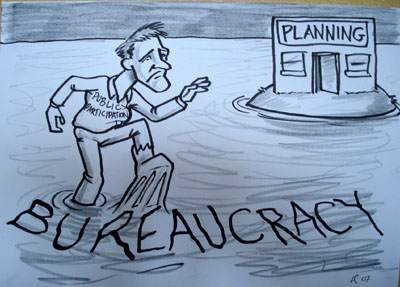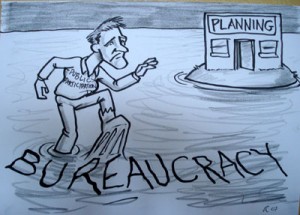Bureaucrats push pencils at the expense of real workers
Life is hard. It’s harder still when an entire class of people with their hands out stands between you and success.
Unfortunately, that’s increasingly the problem, all around the world. A recent New York Times piece tells the story of a Greek woman’s efforts to survive that country’s financial collapse. After losing her job, she tried to start a pastry business, only to find the regulatory environment impossible. Among other things, they wanted her to pay the business’s first two years of taxes up front, before it had taken in a cent. When the business failed, her lesson was this: “I, like thousands of others trying to start businesses, learned that I would be at the mercy of public employees who interpreted the laws so they could profit themselves.”
This phenomenon isn’t limited to Greece, or even to capitalistic societies. Dissident Soviet-era thinker Milovan Djilas coined the term “the New Class” to describe the people who actually ran the Soviet Union: Not workers or capitalists or proletarians, but managers, bureaucrats, technocrats, and assorted hangers-on. This group, Djilas wrote, had assumed the power that mattered in the “workers’ paradise,” and transformed itself into a new kind of aristocracy, even while pretending, ever less convincingly, to do so in the name of the workers. Capitalists own capital, workers own their labor, but what the New Class owned was political control over other people’s capital and labor. Those Greek bureaucrats’ power didn’t come from making things. It came from being able to make people — like our pastry chef — jump through hoops before they could make things.
In the Soviet Union, the situation was even worse. The problem was that what was good for the New Class — rules, programs, and ever-expanding bureaucracy — wasn’t good for the workers, who mostly wanted enough meat, and maybe someday a new washing machine that worked. But despite the system’s formal dedication to equality, the resources, prestige and a variety of legal privileges flowed to the New Class, not to those the New Class was supposedly intended to help. But sadly the New Class isn’t limited to the Soviet Union or Greece.
Here in the United States, a lot of programs officially aimed at the poor look suspiciously like subsidies to the New Class, too. Among “means-tested” programs, Food Stamps, now officially called SNAP, cover about 46 million people up to 125% of the poverty line (set at about $16,000 for a single mother and child). Other programs, such as the Earned Income Tax credit, cover people at slightly higher incomes, up to 200% of the poverty line. When federal spending on the dozens of programs are added up and state and local contributions included, the budget for assistance is about $1 trillion.
If we simply handed those people, perhaps 60 million of them, their share of the cash, that would be more than $16,500 each. A single mom and her baby would get over $33,000, twice as much as a poverty wage. A family of four would land more than $66,000, $15,000 more than the average family income.
So where’s the money going? To people who aren’t poor, such as doctors paid through Medicaid or landlords paid through Section 8. And to tens of thousands of members of the New Class, people like social workers, administrators and lawyers who run more than 120 different means tested federal programs.
It’s not just poverty spending, of course. Higher education spending goes more and more to administrators, not to faculties, and, for that matter, NASA seems more interested in feeding its bureaucracy than in going to Mars, or even back to the Moon.
But the New Class isn’t just in the government, and it isn’t just about money. Along with the government employees are numerous others in related positions, all of which have something to do with facilitating political control: journalism, academia, the entertainment media. These people tend to have a degree of class solidarity; that’s why the news media overwhelmingly tend to define social problems in terms of government solutions, why academia favors a pro-government-power narrative, and why Hollywood productions have businessmen as villains far more often than bureaucrats.
This class solidarity tends to encourage more work for the New Class. And the New Class tends to expand its reach, while simultaneously retarding growth and prosperity, until economic reality asserts itself.
The problem for our society is that whenever political control of other people’s money and labor is allowed, it will tend to breed a class of people who use that control to establish comfortable positions at others’ expense. This is an aristocracy in all but name, one without the tempering effect of noblesse oblige.
. . . . . . . . . . . . . . . .
Glenn Harlan Reynolds, a University of Tennessee law professor, is the author of The New School: How the Information Age Will Save American Education from Itself. This article was published at USA Today.

